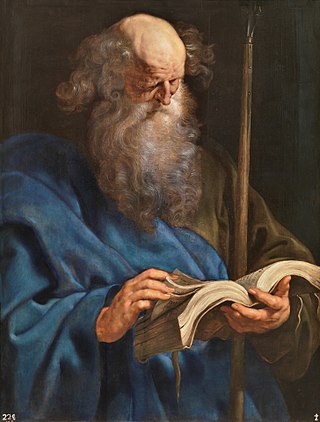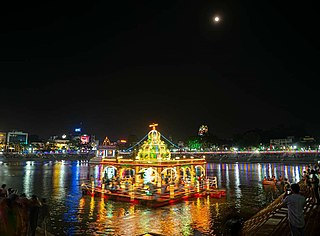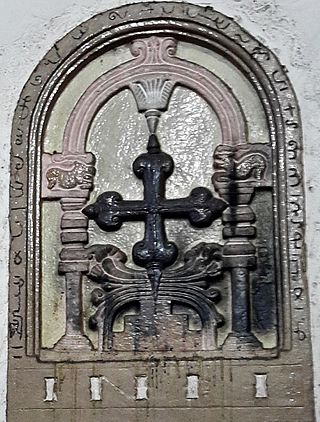
Thomas the Apostle, also known as Didymus, was one of the Twelve Apostles of Jesus according to the New Testament. Thomas is commonly known as "Doubting Thomas" because he initially doubted the resurrection of Jesus Christ when he was told of it ; he later confessed his faith on seeing the places where the wounds had healed on the holy body of Jesus after the Crucifixion of Jesus. While it is often assumed he touched the wounds in art and poetry, the scriptures do not say that he touched the wounds.

Acts of Thomas is an early 3rd-century text, one of the New Testament apocrypha within the Acts of the Apostles subgenre. References to the work by Epiphanius of Salamis show that it was in circulation in the 4th century. The complete versions that survive are Syriac and Greek. There are many surviving fragments of the text. Scholars detect from the Greek that its original was written in Syriac, which places the Acts of Thomas in Edessa, likely authored before 240 AD. The surviving Syriac manuscripts, however, have been edited to purge them of the most unorthodox overtly Encratite passages, so that the Greek versions reflect the earlier tradition.

Mylapore, or Thirumayilai, is a neighbourhood in the central part of the city of Chennai, India. It is one of the oldest residential parts of the city. The locality is claimed to be the birthplace of the celebrated Tamil philosopher Valluvar, and the Hindu saint and philosopher, Peyalvar.

According to Eastern Christian tradition, Addai of Edessa or Thaddeus of Edessa was one of the seventy disciples of Jesus.

Christianity is India's third-largest religion with about 26 million adherents, making up 2.3 percent of the population as of the 2011 census. The written records of Saint Thomas Christians mention that Christianity was introduced to the Indian subcontinent by Thomas the Apostle, who sailed to the Malabar region in 52 AD.

The St Thomas Syro Malabar Catholic International Shrine, Malayattoor is one of the eight international shrines in the world, situated in Malayattoor Angamaly, Ernakulam district of Kerala, India.

Palayūr, also called Palayoor and historically as Palur, is a town near Chavakkad, Thrissur district, India. It is famous for its ancient church, Palayur Mar Thoma Church, which is believed to be one of the seven major churches founded by Saint Thomas the Apostle in Malabar in 52 AD. It is the assumed to be first Christian Church in India.

San Thome Church, officially known as St Thomas Cathedral Basilica and National Shrine of Saint Thomas, is a minor basilica of the Catholic Church in India, at the Santhome neighbourhood of Chennai, in Tamil Nadu. The present structure dates back to 1523 AD, when it was built by the Portuguese over the tomb of Thomas the Apostle. In 1896, it was renovated in the Madras province according to neo-Gothic designs, as was favoured by British architects in the late 19th century.

The Eparchy of Irinjalakuda is a suffragan eparchy in the ecclesiastical province of the metropolitan Syro-Malabar Catholic Archeparchy of Thrissur in Kerala state's Thrissur District, southern India.It is part of the Syro-Malabar Church.

This article lists the various old and ancient churches that exist among the Saint Thomas Christians in Kerala.

Christianity has been, historically, a Middle Eastern religion with its origin in Judaism. Eastern Christianity refers collectively to the Christian traditions and churches which developed in the Middle East, Egypt, Asia Minor, the Far East, Balkans, Eastern Europe, Northeastern Africa and southern India over several centuries of religious antiquity. It is contrasted with Western Christianity, which developed in Western Europe. As a historical definition the term relates to the earliest Christian communities and their long-standing traditions that still exist.

Mar Thoma Sleeva (Saint Thomas Cross) are ancient crosses associated with the community of Indian subcontinent, who trace their origins to the evangelism of Thomas the Apostle in the 1st century AD. The Saint Thomas Christians, which is one of the oldest Christian communities of the world, survive in the Malabar region in state of Kerala, India and have a diaspora in other parts of the Indian subcontinent. Saint Thomas Christian crosses are known as Mar Thoma Sleeva (Saint Thomas cross), Indian cross, or Persian Cross in English, as well as Nasrani Sthambam in Malabarese.
Christianity began as a Second Temple Judaic sect in the 1st century in the Roman province of Judea, from where it spread throughout and beyond the Roman Empire.

Christianity is the third-largest practiced religion in Kerala, accounting for 18% of the population according to the 2001 Indian census. According to traditional accounts, Thomas the Apostle sailed to the Malabar region in 52 AD and introduced Christianity to the area. Although a minority, the Christian population of Kerala is proportionally much larger than that of India as a whole. A significant portion of the Indian Christian population resides in the state.

Palayur Mar Thoma Major Archiepiscopal Church, is located at Palayur, in Thrissur district in Kerala on the west coast of India. According to Saint Thomas Christian tradition, the Syrian church was established in 52 AD by St Thomas, one of the twelve apostles of Jesus Christ. Saint Thomas performed the first baptism in India here, therefore this church is called an Apostolic Church credited to the apostolate of St. Thomas, who preached and also introduced Christianity to the people here. It is part of the Ēḻarappaḷḷikaḷ that he established in India, the others being at Cranganore, Kokkamangalam, Kottakkavu, Kollam, Niranam, and Chayal (Nilackal). The original small church structure has been retained at the original site. But substantial improvements around it were carried out during the 17th century by Giacomo Fenicio as necessary, without sacrificing the main sanctity of the place.
Early Christianity, otherwise called the Early Church or Paleo-Christianity, describes the historical era of the Christian religion up to the First Council of Nicaea in 325. Christianity spread from the Levant, across the Roman Empire, and beyond. Originally, this progression was closely connected to already established Jewish centers in the Holy Land and the Jewish diaspora throughout the Eastern Mediterranean. The first followers of Christianity were Jews who had converted to the faith, i.e. Jewish Christians, as well as Phoenicians, i.e. Lebanese Christians. Early Christianity contains the Apostolic Age and is followed by, and substantially overlaps with, the Patristic era.

Christianity in the state of Tamil Nadu, India is the second largest religion in the state. According to tradition, St. Thomas, one of the twelve apostles, landed in Malabar Coast in AD 52. In the colonial age many Portuguese, Dutch, British and Italian Christians came to Tamil Nadu. Priests accompanied them not only to minister the colonisers but also to spread the Christian faith among the non-Christians in Tamil Nadu. Currently, Christians are a minority community comprising 6% of the total population. Christians are mainly concentrated in the southern districts of Tamil Nadu - Kanyakumari, Thoothukudi and Tirunelveli.

The Saint Thomas Christian denominations are Christian denominations from Kerala, India, which traditionally trace their ultimate origins to the evangelistic activity of Thomas the Apostle in the 1st century. They are also known as "Nasranis" as well. The Syriac term "Nasrani" is still used by St. Thomas Christians in Kerala. It is part of the Eastern Christianity institution.
Chennai is religiously cosmopolitan, with its denizens following various religions, chief among them being Hinduism, Islam, Christianity, Sikhism, Jainism, Buddhism, and Zoroastrianism. Chennai, along with Mumbai, Delhi, Kochi, and Kolkata, is one of the few Indian cities that are home to a diverse population of ethno-religious communities.
Ēḻarappaḷḷikaḷ or Ezharappallikal, are the seven major churches or Christian communities of Saint Thomas Christians across Malabar Coast of India that are believed to have been founded by Thomas the Apostle in the first century. According to Indian Christian traditions, the apostle Thomas arrived in Muziris (Kodungallur) in AD 52, established the Ezharappallikal and evangelised in present-day Kerala and Tamil Nadu. Many of these churches built near Jewish and Brahmin settlements. These were at Maliankara (Kodungallur), Kollam, Palayoor, Kottakkayal, Kokkamangalam, Niranam and Nilackal (Chayal). Thiruvithamcode church in Kanyakumari was built on the land given by arachan (king) and hence it is often referred in the name Arappally. Similarly, the Churches at Malayattoor and Aruvithura are also referred to as Arappallikal.












